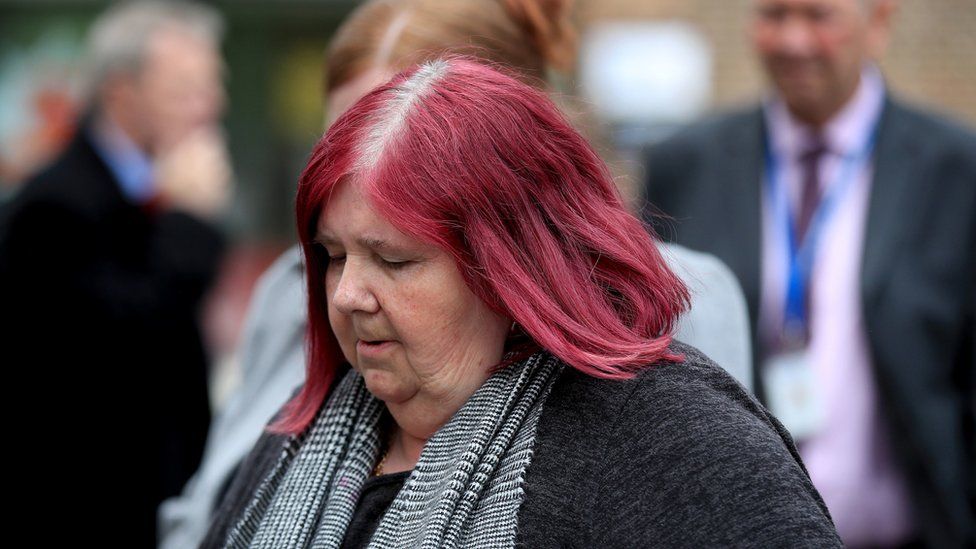BBC 'extremely sorry' over loss of murdered schoolgirl's clothes
- Published

The BBC has apologised for the "distress" caused to the mother of a murdered schoolgirl who said Martin Bashir borrowed her daughter's clothes and did not return them.
Michelle Hadaway says Mr Bashir wanted the clothes DNA tested for a BBC programme but never gave them back.
Karen Hadaway and Nicola Fellows, both nine, were found sexually assaulted and strangled in Brighton in 1986.
The BBC said it would look into any new details on the clothes' whereabouts.
The corporation added that Mr Bashir - who was most recently the BBC's religion editor before resigning earlier this year - was contacted via his agent, who said the journalist was unable to help with locating the clothes.
The BBC statement follows an investigation by the Mail on Sunday into Mr Bashir's actions after what became known as the Babes in the Wood murders.
The newspaper claims that a 2004 inquiry by the corporation's investigations unit did not contact people who might have known where the clothing was - such as the families of the murdered schoolgirls and journalists who worked on the BBC's Public Eye programme.
A spokesman for the BBC said: "The BBC is extremely sorry for the distress this has caused Ms Hadaway and we deeply regret we have not been able to give her any answers about what happened.
"We are appalled that this clothing was lost after being obtained as part of an investigation for a BBC programme.
"We are continuing to look into this matter following the Dyson inquiry, and as part of that, we asked a former senior BBC executive to review what happened in this case, including the 2004 investigation, and see if anything was missed which could help us locate the clothing."
The BBC said claims that in 2004 the BBC investigations unit did not make contact with individuals who might have known where the clothing was were incorrect.
It added: "Records show that (Public Eye editor) Nigel Chapman and an individual who can be identified as (assistant producer) Charlie Beckett were contacted during the 2004 investigation.
"Martin Bashir was contacted via his agent, who told us that Martin was unable to assist with the whereabouts of the clothes.
"Eileen Fairweather had left the employment of Public Eye before the clothing went missing.
"We will continue to follow up any new information we receive about the whereabouts of the clothing. We will of course discuss any of this matter with Ms Hadaway if and when she wishes to do so."
The families of the two girls campaigned for decades for justice after their killer Russell Bishop was initially cleared of their killings in 1987.
In 2018, he was convicted of the murders after double jeopardy laws were changed, permitting a second trial.
Ms Hadaway said Mr Bashir - then a BBC staff reporter - approached her in 1991 and asked to take her daughter's clothes for DNA testing as part of his investigation for a documentary - but the programme never aired and her calls to the broadcaster went unanswered.
She has said the tests were not carried out and her daughter's clothes were never returned.
In a previous interview with BBC Radio 4's Woman's Hour, Ms Hadaway said: "Over the years I have been so angry with the fact this man has never apologised to me, never contacted me.
"The denials have been going on for quite a long time," she added.
She said she had trusted Mr Bashir with "the last thing that I had to do with my daughter, which was her clothes".
"To not give them to me back, or to not have them DNA tested, is a bit shameful," she said.
Asked about claims by the Sunday Times newspaper, Mr Bashir said: "I may have lost it, but I don't remember."
Earlier this week, London's Metropolitan Police said it would take no further action over Mr Bashir's 1995 BBC Panorama interview with Diana, Princess of Wales.
The Metropolitan Police looked at an independent review of the methods used to obtain the 1995 interview, but had "not identified evidence of activity that constituted a criminal offence".
The review, by Lord Dyson, found Bashir had used deception to secure it.
It comes as BBC director-general Tim Davie will appear before the Digital, Culture, Media and Sport Committee on Tuesday.
- Published15 September 2021
- Published25 May 2021
- Published19 May 2021